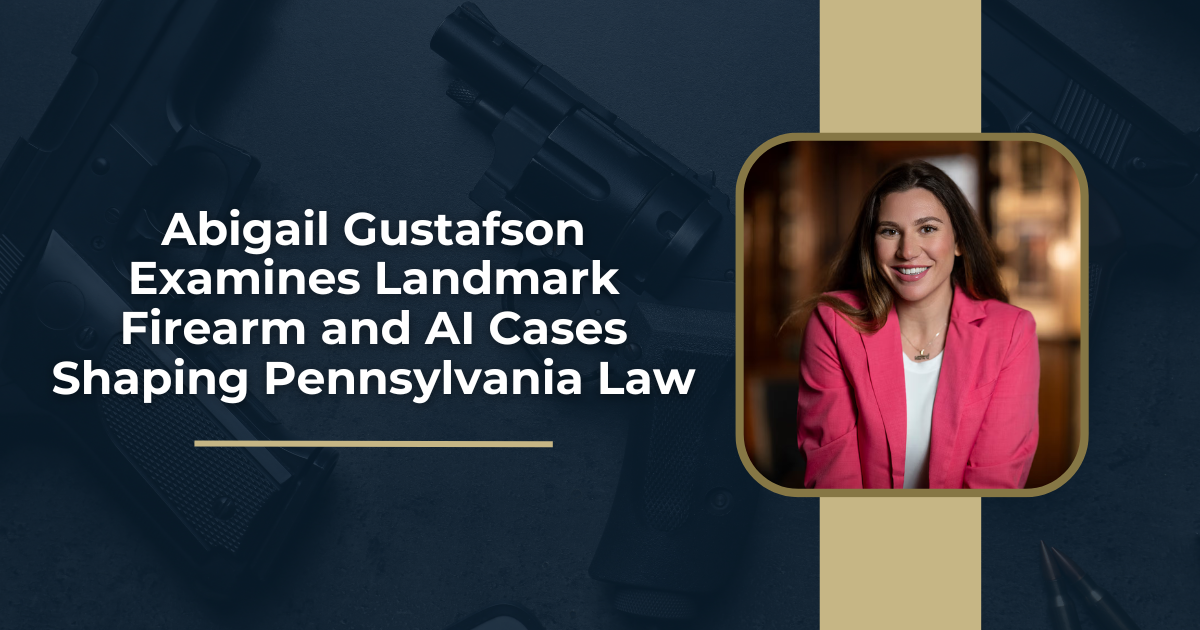Criminal defense attorney Abigail Gustafson of van der Veen, Hartshorn, Levin & Lindheim has emerged as a clear voice on constitutional issues shaping Pennsylvania criminal law. Through her publications for the Pennsylvania Association of Criminal Defense Lawyers (PACDL), she translates complex appellate rulings into practical takeaways for lawyers and clients, showing how equal protection, challenges, firearm statutes, and the growing role of artificial intelligence in criminal prosecutions affect real cases on the ground.

Her latest analysis of Commonwealth v. Sumpter and helps readers understand why the decision matters for Philadelphia residents and how future challenges may unfold across the state.
Commonwealth v. Sumpter
In June 2025, the Pennsylvania Superior Court issued a landmark decision in Commonwealth v. Sumpter, holding that 18 Pa. C.S. § 6108 is unconstitutional as applied to Mr. Sumpter under the Equal Protection Clause. The statute prohibits carrying a firearm without a license in Philadelphia, a restriction unique to the city.
Background on the Case
Mr. Sumpter was arrested following an interaction with police when they saw the handle of a firearm peeking out from his waistband. Though Pennsylvania law generally allows individuals 18 and older to openly carry guns (as long as they’re not prohibited due to prior offenses and other related concerns), Philadelphia has been the exception due to 18 Pa. C.S. § 6108. After law enforcement noticed the firearm, Sumpter (who said he was carrying the gun for protection on account of the high number of shootings in the city) was arrested and charged with two crimes:
- Carrying firearms on public streets or public property in Philadelphia
- Firearms not to be carried without a license
The court dismissed the firearms not to be carried without a license charge following a preliminary hearing. Sumpter pleaded guilty to one count of carrying firearms on public streets or public property in Philadelphia. However, he later appealed the conviction, stating that 18 Pa. C.S. § 6108 infringed upon his right to equal protection under both Pennsylvania state law and the U.S. Constitution.
The case brought up two important questions: Is it unconstitutional to single the city of Philadelphia out when its citizens have a constitutional right to bear arms and would previous precedent be reanalyzed in light of recent U.S. Supreme Court rulings, most notably New York State Rifle & Pistol Association, Inc. et al. v. Bruen, Superintendent of New York State Police.
To help come to a conclusion, the court looked at Commonwealth v. Scarborough, another case in which the constitutionality of Section 6108 was challenged. In it, Scarborough appealed his conviction, stating that those convicted of carrying an unlicensed firearm are punished more harshly in Philadelphia than elsewhere in the state. At the time of the Scarborough ruling, it was determined that the right to carry a firearm on the streets of Philadelphia was not a fundamental right. However, fast forward and things have changed. The U.S. Supreme Court ruled that the right to bear arms is in fact a fundamental right. Because of this, the court in Sumpter was able to analyze the statute with a strict scrutiny analysis, dismissing Commonwealth’s argument that the Equal Protection Clause requires all similarly situated individuals to be treated alike. As explained in the ruling, the court was “not so much concerned with the validity of 6108 as they are with whether [the] appellant is unfairly discriminated against under the law in comparison to persons outside Philadelphia.”
This ruling is significant to those facing firearm charges in Philadelphia, as it limits the Commonwealth’s ability to enforce Section 6108 in a way that treats Philadelphia differently from the rest of the state.
Commonwealth v. Weeden
In another publication, Commonwealth v. Weeden: Is AI Conflicting with a Criminal Defendant’s Right to Confrontation, Abigail examines how emerging technology is reshaping long-standing constitutional protections. She not only analyzes the court’s reasoning in Commonwealth v. Weeden, but also explores the broader implications of using AI tools like ShotSpotter in criminal prosecutions and what this could mean for defendants’ rights in the years ahead.
Background on the Case
In December 2018, Mr. Weeden was arrested and charged with multiple counts of aggravated assault and recklessly endangering another person, as well as several firearms violations, after ShotSpotter tracked a gunshot to his location.
ShotSpotter, which is owned and operated by SoundThinking, Inc. is a patented program that alerts local law enforcement to gunshots in the area. The technology works by using sensors placed around a city to pick up the sound of gunfire. When a loud noise like a gunshot is detected, the system compares data from multiple sensors to figure out where the shot came from. That data, once reviewed by ShotSpotter’s internal review system, is then forwarded to the police so they can dispatch officers to the scene, find the perpetrator and get the victim help.
Weeden was alleged to have followed his ex-girlfriend, her friend and her friend’s eight-year old daughter in their vehicle on the night of December 15, 2018, where he later approached his ex from the passenger side. When he did, the child in the backseat yelled “gun,” and then gunshots were fired. ShotSpotter picked up the gunfire, however, when police arrived, they couldn’t find any physical evidence of a shot being fired.
At the trial, several civilian and law enforcement witnesses provided testimony, including one detective, who did not: 1. possess a ShotSpotter certification; 2. have a role in the preparation of the Summary report (which was automatically created with a description of the program, date and time of the incident and number of shots fired); 3. possess any information about reviews of the Summary by another person. Despite this, the automated Summary report was allowed into evidence.
Later, it was revealed that not only did the lead officer in the case and the officers who arrived on the scene not find any ballistic evidence of a gunshot (nor any evidence in Weeden’s home or vehicle), but the Summary was created more than five months after the incident. Weeden was found guilty of the majority of charges against him, including aggravated assault, firearms not to be carried without a license, propelling a missile into an occupied vehicle, discharging a firearm and three counts of recklessly endangering another person.
Following his conviction, Weeden appealed the decision, arguing that admission of the Summary violated the Sixth Amendment right to confrontation. However, since Weeden didn’t indicate who he wanted to confront, the court affirmed his conviction, stating that without naming a party to confront, there is no violation of the Sixth Amendment’s Confrontation Clause.
While the Confrontation Clause gives defendants the right to cross-examine their accuser, it only applies to testimonial statements given with the intent to be used as evidence. Since this was not the Summary’s intent, the Pennsylvania Supreme Court determined that no such violation occurred.
About Abigail Gustafson
An experienced criminal defense attorney and Pennsylvania Super Lawyers Rising Star, Abigail Gustafson is quickly becoming a respected voice in cases shaping today’s courts and legal landscape across the country. She holds an LLM in Trial Advocacy from the Temple University Beasley School of Law and a JD from the Thomas R. Kline School of Law at Duquesne University. In addition to her advocacy for clients at van der Veen, Hartshorn and Levin, she offers her services pro bono for both the Pennsylvania Innocence Project and Philadelphia VIP.
To schedule a consultation with Abigail or anyone at the van der Veen, Hartshorn and Levin team, call 215-546-1000 or fill out our online contact form. Our firm represents clients throughout Pennsylvania, including Philadelphia County, Bucks County, and Chester County.
Disclaimer: This blog is intended for informational purposes only and does not establish an attorney-client relationship. It should not be considered as legal advice. For personalized legal assistance, please consult our team directly.
